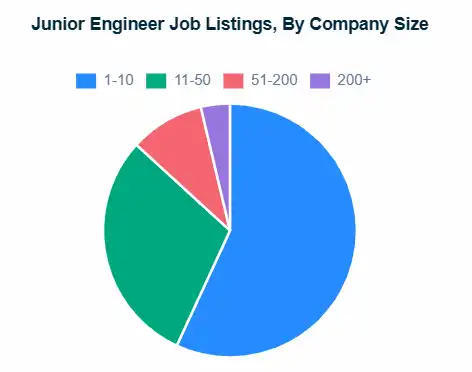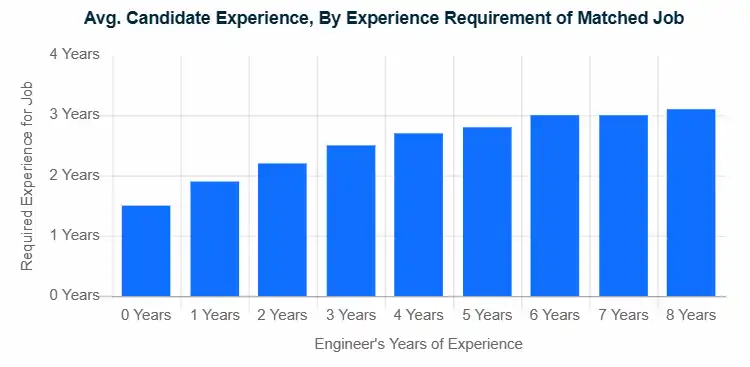Don’t panic if your inbox isn’t full of $200k job offers.
Even for senior engineers, job searches can be confusing, frustrating affairs. When you’re a junior engineer looking for your first job, it can feel like you’re flying blind.
You may be armed with general notions about the engineering job market. Engineers are in demand, salaries are relatively high, unemployment is low, and more. What you might not have is context on what finding your first job will actually look like. How many companies should you be applying to? What kind of starting salary is normal? What roles should you even be applying for?
We analyzed thousands of first-time engineering hires on AngelList over the last 18 months to answer all of the above and more. Below we’ve broken down the data. It’s important to note, though, that it only reflects the candidate experience on AngelList, where job opportunities skewing heavily toward startups.
1. How many jobs should I apply to?
Short answer: As many as it takes.
This is a broad question that depends on your criteria for jobs. For example, if you’re only interested in hardware engineering jobs in Reno, you’re dealing with a very limited talent pool and job market. That being said, if we zoom out to the national level, the average U.S.-based software engineer with zero years of experience applies to 23 jobs on AngelList before getting hired.
Of course, there are a number of factors that will influence this number:
- The types of companies you are interested in
- The array of roles you are open to
- Any VISA sponsorships or other special considerations you might need
If you have applied to 23 jobs without getting hired, that does not mean your job search has been a failure—23 is just the average—and if you’ve yet to apply to 23 jobs, it’s way too early to begin feeling worried.
Also, this isn’t a directive to apply to 23 jobs today. This should simply serve to set some expectations for your job hunt.
2. What kind of companies do I have the best odds with?
Note: Do not confuse this question with “What kind of company do I most want to work at?”
Based on our hiring data, early-stage companies are more open to hiring engineers with zero years of experience. The actual breakdown of companies, segmented by size, posting engineering jobs that are open to candidates with zero years of experience looks like this:

- Does the company have senior talent to mentor you?
- Is this company in a financial position to offer you a livable salary?
- Do you want to work in a typically less structured, but freer early-stage environment?
Early-stage companies are a high-risk, high-reward proposition. The vetting process (which we have a guide to here) is even more crucial when you’re considering joining a company at this stage.
3. Do I apply to roles I’m not qualified for?
There’s a difference between not matching all the criteria in a job listing, and not being qualified for the job.
When companies list a minimum years of experience for a job, they aren’t literally saying you couldn’t do this job without having worked that many years previously. They’re saying that the role requires you to produce at the level they’d expect someone with that much experience to produce at. We also wrote an entire article on this topic, if you’d like to dig deeper.
But as you can see below, most engineers with zero years of experience match with companies on AngelList whose job listing requires more than one year of experience:

One caveat here is that we’re talking specifically about years of experience, not domain knowledge or particular skills. If a job listing requires you to be knowledgable in machine learning, while you’ve never studied the topic, that’s an example of a job you are unqualified for.
In general, as long the role is interesting to you and seems realistically within your capabilities, you are qualified enough to apply.
4. Which roles are the most open to junior-level candidates?
Maybe you aren’t picky about role specialization or which part of the stack you spend your time working on. In that case, the natural question becomes: What kind of role is most open to hiring inexperienced engineers?
Note: We use the catchall “General” for job listings that do not specify a particular engineering role, and instead hire for a general “Software Engineer.”
There are two big takeaways here.
First, full-stack roles are the second most common role junior-friendly role, coming only after general engineering roles. Full-stack roles are more common at early stage startups, and U.S.-based early stage startups are more likely to hire junior engineers.
Second, roles that are more concerned with infrastructure—systems engineers and DevOps roles, for example—are the least likely to hire someone with no experience.
5. Am I a failure if I don’t make $200,000?
Many junior engineers, after spending too much time reading threads on Blind, get the sense that everyone makes $200,000 at their first job.
Here’s the rub: They don’t.
There is not an entry level engineering role that, when averaged across the U.S., lists an average salary of $100,000 or above. Of course, scoped to different areas of the country, the results look slightly different:
For job listings in San Francisco, the averages all rise. But even then, only DevOps and systems engineering roles—the roles least likely to hire entry-level candidates—average over $100,000, meaning it is still only a small percentage of junior engineers making six figures.
While tech giants may offer gargantuan salaries with large signing bonuses to new engineers, those roles are in the extreme minority. Most engineers do not begin their careers there, and you shouldn’t feel like your career is underwhelming simply because you didn’t start it at Google.
What do you want?
While all of these statistics may be helpful context, they won’t answer the core question that will define your job search: What do you want out of your job?
If you want the fastest possible growth trajectory, early-to-mid-stage startups are your best bet. AngelList founder Naval Ravikant has a complete guide to vetting and choosing one of these companies based on vetting the quality of people connected to it.
If you want to maximize your salary right out of the gate, you should be looking at bigger, more mature companies. They typically have the funding and revenue to pay their entry level hires more.
If you want exposure to founder-level responsibilities, you should join a seed stage company. These are tough companies to vet—you almost have to think like an investor. We have a guide to evaluating which early stage company you should join based on the state of their finances and the quality of their team.
Ultimately, the ideal first job for you is going to come down to what you’re looking for in a role. With guiding data and a little soul searching, you should be able to start to sketch out how your job search is about to unfold—and navigate it accordingly.












